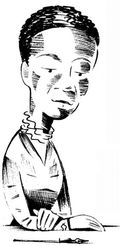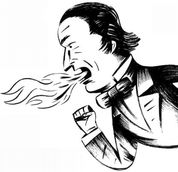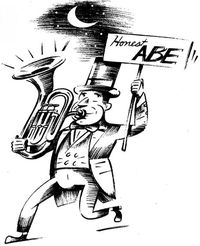Two Miserable Presidents (4 page)
Read Two Miserable Presidents Online
Authors: Steve Sheinkin

B
ut Lincoln was not forgotten. Mostly because the issues he talked about were becoming more and more explosive.
ut Lincoln was not forgotten. Mostly because the issues he talked about were becoming more and more explosive.
This was thanks largely to John Brown. Brown somehow made it out of Kansas alive and showed up in New England, where he began raising money for a new plan. Convinced that he had been chosen by God to strike a deadly blow against slavery, Brown now attempted to spark a massive slave rebellion. On the cold, drizzly night of October 16, 1859, Brown marched into the town of Harpers Ferry, Virginia, with an “army” of twenty-one men, white and black.
One of Brown's soldiers was Dangerfield Newby, a former slave who was hoping to free his wife from slavery in Virginia. In his pocket Newby carried a letter from her:
“Dear Husband ⦠There has been one bright hope to cheer me in all my troubles, that is to be with you, for if I thought I should never see you, this earth would have no charms for me. Do all you can for me, which I have no doubt you will. I want to see you so much.
Brown's small force seized the federal armoryâa building full of guns and ammunition. They snatched a few people to hold hostage. (One of the hostages was George Washington's great-grandnephew.)
Then they waited for slaves to race to Harpers Ferry, take the weapons, and start freeing people all through the South.
Then they waited for slaves to race to Harpers Ferry, take the weapons, and start freeing people all through the South.
Harriet Newby

Ever since that night, people have been arguing about whether or not John Brown was insane. One thing we can all agree on: his plan was very bad. Brown brought no food along and had to send out to a nearby hotel for breakfast for his men and hostages. More important, he didn't arrange any way of letting slaves on nearby farms know what was going on in Harpers Ferryâso how were they supposed to know to join the rebellion?
The people in Harpers Ferry knew what was going on, of course, and they grabbed their guns and began shooting at Brown's army. The first of Brown's men to die was Dangerfield Newby. Within twentyfour hours, a U.S. Army officer named Robert E. Lee led a group of soldiers to Harpers Ferry and attacked Brown's crew. One of Lee's men captured Brown after smacking him on the head with a sword.
Seventeen men lay dead, including ten of Brown's men (two of the dead were his sons). While Brown lay on a cot with his head wrapped in bloody bandages, he was angrily questioned by the Virginia senator James Mason:
Mason:
What was your object in coming?
What was your object in coming?
Brown: We came to free the slaves.
Mason: How do you justify your acts?
Brown: I think, my friend, you are guilty of a great wrong against God and humanity.
Virginia authorities quickly put Brown on trial, found him guilty, and hanged him on the morning of December 2. He left behind a brief note: “I John Brown am now quite certain that the crimes of this guilty land will never be purged away, but with Blood.”
John Brown died knowing he had shoved the nation toward a major crisis. It was as if he had lit the fuse on a massive bomb.
A
s Brown's body swung from the end of a rope in Virginia, church bells tolled in many Northern towns. Cannons fired salutes to Brown's memory. And abolitionist newspapers praised Brown as a hero, even a saint, who had bravely died battling the evil of slavery.
s Brown's body swung from the end of a rope in Virginia, church bells tolled in many Northern towns. Cannons fired salutes to Brown's memory. And abolitionist newspapers praised Brown as a hero, even a saint, who had bravely died battling the evil of slavery.
Many Northern leaders, including Abraham Lincoln, spoke out against John Brown's raid. Lincoln considered Brown a madman and a murderer. But this hardly calmed the fury that was sweeping though the South. Southern leaders charged that people such as Lincoln, people who kept hammering away on the slavery issueâthey were the ones who had inspired John Brown in the first place.
Nothing terrified white Southerners like the thought of millions of enslaved people, armed and angry, rising in rebellion. And they believed abolitionists and Republicans were working to make this happen. Senator Jefferson Davis of Mississippi accused Northerners of trying “to incite slaves to murder helpless women and children.”
Most white Southerners were not slave owners. And most were strong supporters of the Union. But Brown's action was seen as a Northern invasion of the Southâpractically a declaration of war. “THE DAY OF COMPROMISE IS PASSED” declared a South Carolina newspaper. Southerners naturally sided with their own section of the country. “Never before, since the Declaration of Independence, has the South been more unified,” wrote one reporter.
Tensions between North and South exploded in Washington, D.C., where members of Congress showed up to work with weapons tucked into their pants.
“The only persons who do not have a revolver and a knife are
those who have two revolvers,” said Senator James Hammond of South Carolina. An all-out firefight nearly erupted on the floor of Congress when, in the middle of a furious shouting match, a pistol fell from the pocket of a New York congressman.
those who have two revolvers,” said Senator James Hammond of South Carolina. An all-out firefight nearly erupted on the floor of Congress when, in the middle of a furious shouting match, a pistol fell from the pocket of a New York congressman.
What would happen if the country tried to elect a new president at a time like this? Americans were about to find out.
In
April 1860 leaders of the Democratic Party met in Charleston, South Carolina, to choose their candidate for president. After years of leadership in the Democratic Party, Stephen Douglas was pretty sure he would win the nomination. He was in for a shock.
April 1860 leaders of the Democratic Party met in Charleston, South Carolina, to choose their candidate for president. After years of leadership in the Democratic Party, Stephen Douglas was pretty sure he would win the nomination. He was in for a shock.
The convention hall in Charleston was filled with “fire-eaters”âSouthern Democrats who were no longer interested in compromise with the North. The fire-eaters rejected Stephen Douglas's idea that voters in western territories should vote on slavery. They demanded new laws protecting slavery in all the western territories, and they wanted them now! Fire-eater William Yancy of Alabama spoke to a roaring crowd:
“What right of yours, gentlemen of the North, have we of the South ever invaded? ⦠Ours is the property invaded ⦠ours is the peace that is to be destroyed; ours is the property that is to be destroyed; ours is the honor at stake!”
William Yancy

Refusing to support Douglas, the fire-eaters walked out of the convention. The Democratic Party split in twoâand went on to nominate two different candidates for president: Stephen Douglas in the North and John Breckinridge in the South.
Alexander Stephens, a Georgia leader who hoped to save the Union, feared this split would lead to disaster.
“What do you think of matters now?” a friend asked Stephens.
“Think of them!” Stephens cried. “Why, that men will be cutting one another's throats in a little while. We shall, in less than twelve months, be in a civil war, and one of the bloodiest in the history of the world.”
Stephens knew that the votes of Democrats would now be split between two candidates. That would make it much easier for a Republican to win the election. And many Southerners were openly vowing that they would sooner break up the Union than live under a Republican president.
B
ut Republicans were pretty excited about living under a Republican president. They knew this was their big chance.
ut Republicans were pretty excited about living under a Republican president. They knew this was their big chance.
The city of Chicago turned into one huge carnival when Republicans met in May to pick their presidential candidate. Liquor flowed at nonstop parties, brass bands played, and everyone marched around waving hats and canes. But they also had some serious business: picking the person with the best chance of winning this election. Republican leaders agreed on a few things:
We need someone who is respected as honest and intelligent.
We want someone a little famous, but not too famous. Famous politicians usually have lots of powerful enemies.
⢠We know we can win the Northeastern states no matter whom we nominate. We need someone who can also win key Midwestern states such as Indiana and Illinois.
The more they thought about it, the more Republicans liked the idea of that tall guy from Illinois, the one who had spoken so well in those debates with Stephen Douglas ⦠Abraham Lincoln!
This is just what Lincoln was hoping would happen. He sent a team of friends to Chicago to fight for his nomination. (Candidates never campaigned for themselves in those daysâit was considered ungentlemanly.) Lincoln's men worked behind the scenes convincing important Republicans that “Honest Abe” was the most likely man to win a national election. They also found the loudest shouters in Illinois, brought them to the convention hall, and paid them to yell like crazy for Lincoln every time they were given a secret signal. “A herd of buffaloes or lions could not have made a more tremendous roaring,” said one reporter.
Back home in Springfield, Lincoln was nervously checking in at the telegraph office every few hours. On May 18 he tried to relax by playing a few games of handball. Then he went with friends to a newspaper office to wait for news. A huge crowd gathered, eager for updates. Finally, an editor ran in with a telegram from Chicago. Lincoln read it to himself, then read it out loud. He was the Republican nominee for president of the United States.
Suddenly swarmed with cheering supporters, Lincoln worked his way through the crowd, telling people, “Well, gentlemen, there is a short woman who will be interested in this news, and I will go home and tell her.”
And he went home to tell Mary.
T
he election of 1860 really turned into two different electionsâone in the North and one in the South. In the North, Abraham Lincoln battled Stephen Douglas for votes. Lincoln supporters formed “Wide Awake” clubs, groups that marched all night carrying torches, playing horns, and singing their theme song:
he election of 1860 really turned into two different electionsâone in the North and one in the South. In the North, Abraham Lincoln battled Stephen Douglas for votes. Lincoln supporters formed “Wide Awake” clubs, groups that marched all night carrying torches, playing horns, and singing their theme song:
Ain't you glad you joined the Republicans?
Joined the Republicans,
Joined the Republicans,
Ain't you glad you joined the Republicans
Down in Illinois?
Joined the Republicans,
Joined the Republicans,
Ain't you glad you joined the Republicans
Down in Illinois?
In the South everyone knew that most of the votes would go to John Breckinridge, or to a fourth candidate, John Bell of Tennessee.
Americans felt a growing nervousness as Election Day approached. Some Southern newspapers were predicting that a Lincoln victory would mean death to the Union. One South Carolina paper put it simply: If Lincoln wins, it said, “there will have to be a separation from the North.”
November 6, 1860, was a warm and sunny day in Springfield, Illinois. That afternoon Lincoln walked over to the county courthouse to vote. Later, after the polls had closed, he walked to the telegraph office and sat down on a couch.

At about nine o'clock the telegraph machines began tickingânews was coming in.
Other books
Murder by Mocha by Cleo Coyle
The Night Sister by Jennifer McMahon
The Demon Trappers: Foretold by Jana Oliver
Fall and Rise by Stephen Dixon
Working for Him by Willa Edwards
Sophie & Carter by Chelsea Fine
The Perilous Life of Jade Yeo by Zen Cho
Wild Hyacinthe (Crimson Romance) by Sarina, Nola, Faith, Emily
Gray Vengeance by Alan McDermott